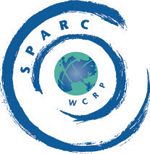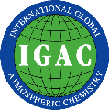|
S P A R C Modelling of Deep Convection and of Chemistry and their Roles in the SPARC-GEWEX/GCSS-IGAC Invitational workshop 12-15 June 2006 |
||
|
||
The tropical tropopause layer (TTL) is a transition layer in which the air has mixed stratospheric and tropospheric properties. The TTL has increasing levels of ozone with height, large lapse rates and near its base the net radiative heating changes sign from negative below to positive above. The heat, moisture and chemistry budgets of the TTL ultimately affect the properties of stratospheric air. These budgets are influenced by slow ascent within the upward branch of the Brewer-Dobson circulation and by overshooting deep moist convection, which is an effective transport method from the boundary layer. The relative importance of the contribution of deep moist convection to the heat, moisture and chemistry budgets of the TTL is still uncertain and subject of debate. The TTL has received attention within the SPARC (Stratospheric Processes and Their Role in Climate) community from the perspective of its importance for processes in the tropical lower stratosphere, while research on modelling and understanding of deep convection in the tropics has received considerable attention within the GEWEX Cloud System Study (GCSS). The IGAC (International Global Atmospheric Chemistry) community is interested in the role of deep convection in transporting and processing chemical constituents and aerosols. The aim of this workshop is to bring together expertise from these communities and related research activities on stratospheric processes and modelling of deep convection and chemistry in the tropics to set the stage for a better understanding of the role of convection in determining the thermal structure and composition of the TTL. The workshop will be organized into three main sections: Overviews of historical development and current TTL research (Day 1), Modelling deep convection in the tropics (Day 2), Coupling of deep convection and chemistry (Day 3). There will be organized breakouts, discussion, and poster sessions in addition to plenary sessions devoted to oral presentations. The last half-day (Day 4) will be devoted to summarizing and discussing the outcomes of the workshop and future directions. |
| Last update: May24, 2006 |


